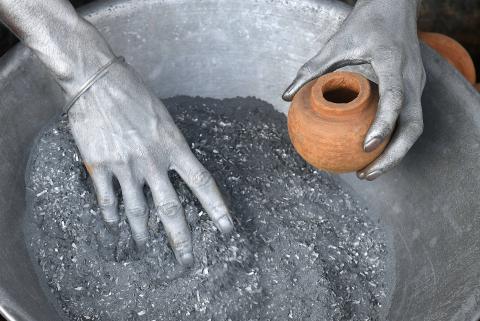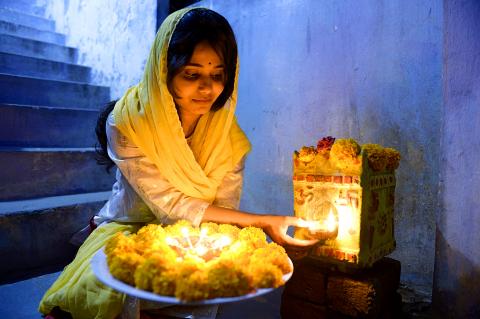Diwali, or Deepavali, is one of the most popular festivals of Hinduism, celebrated throughout India and in many other countries around the world.
A longstanding tradition dating back to ancient times in India, it is celebrated every year over five days between mid-October and mid-November in the northern hemisphere. This year, it started on Tuesday and wraps up today. The main festivities took place on Thursday, the third day of the festival.
The name diwali derives from the Sanskrit words dipam, meaning “light, lamp” and oli, for “glow of light.” The festival signifies the victory of light over darkness, of good over evil, hope over despair, and of knowledge over ignorance.

Photo: AFP
照片:法新社
The first day, Dhanteras, is all about celebrating wealth. People clean their houses thoroughly in preparation for this day, in order to welcome Lakshmi, the goddess of prosperity, into their homes.
On the main day, the third of the five days, fireworks are set off, and diyas — small clay lamps — and candles are placed around the home. This is what gives diwali the name “the festival of lights.”
(Paul Cooper, Taipei Times)

Photo: AFP
照片:法新社
排燈節是最受歡迎的印度教節慶之一,印度各地和許多國家都過排燈節。
排燈節的傳統由來已久,可追溯至古印度時期,每年十月中至十一月中北半球都會舉行五天的慶祝活動。今年的慶典自本週二開始,到今天結束;主要的慶祝活動是在第三天,也就是本週四舉行。
排燈節的原文diwali源自梵文的dipam和oli:dipam意指「光」和「燈」,而oli指「光芒」。此節慶象徵光明戰勝黑暗、良善戰勝邪惡、希望戰勝絕望,以及知識戰勝無知。

Photo: EPA
照片:歐新社
慶典的第一天是慶祝財富的財神節。人們為了準備這天會把房子徹底清掃乾淨,以迎接印度教繁榮昌盛之神吉祥天女的來訪。
在這為期五天的慶典中,主要的活動是在第三天,當天會放煙火,也會在住家各處擺放陶土製小燈以及蠟燭。這就是為什麼排燈節又叫做「光明節」。
(台北時報編譯林俐凱譯)

Photo: AFP
照片:法新社

The Dutch introduced the Indian mango (Mangifera indica) to Taiwan in the 17th century. It is a green-skinned mango with thick fibers that get stuck in the teeth, but it boasts a rich aroma and a unique taste. In 1954, Taiwan’s Council of Agriculture introduced several mango cultivars from Florida, USA, including the Irwin, Haden, and Keitt varieties. After seven years of testing and domestication, the Irwin variety was chosen for promotion. Years later, the sample saplings started to bear fruit. These mangoes were large, with thin, vibrant red peels and golden pulp. The Irwin mangoes were mouth-wateringly sweet and

As the priest Antonius Hambroek stood in the dim chamber of Fort Zeelandia, his eldest daughter clung to him, her voice trembling. “Father, don’t go. They’ll kill you, and what will become of Mother and my sisters?” Outside, the sounds of Koxinga’s relentless canon siege boomed through the fortress. The defenders were on the brink of collapse. Starvation gnawed at their resolve, and the air carried the acrid stench of spent gunpowder and rotting flesh. Dutch reinforcements from Batavia had failed to arrive, leaving the garrison isolated and hopeless. Hambroek’s face was calm, though sorrow weighed heavily on his

對話 Dialogue 清清:今天中午我要多吃一點,不然晚上可能會吃不飽。 Qīngqing: Jīntiān zhōngwǔ wǒ yào duō chī yìdiǎn, bùrán wǎnshàng kěnéng huì chībùbǎo. 華華:怎麼了?為什麼會吃不飽? Huáhua: Zěnmele? Wèishénme huì chībùbǎo? 清清:今天大年初七,是「人日節」,傳統上結了婚的女兒要回家給父母送長壽麵,而且最好是素的,我姐姐會回來,只吃素麵,我應該很快就餓了。 Qīngqing: Jīntiān Dànián chūqī, shì “Rénrì jié,” chuántǒng shàng jiéle hūn de nǚ’ér yào huíjiā gěi fùmǔ sòng chángshòumiàn, érqiě zuìhǎo shì sù de, wǒ jiějie huì huílái, zhǐ chī sùmiàn, wǒ yīnggāi hěn kuài jiù èle. 華華:我還是第一次聽說有「人日節」呢!這是怎麼來的啊? Huáhua: Wǒ háishì dì yī cì tīngshuō yǒu “Rénrì jié” ne! Zhè shì zěnme lái de a? 清清:老一輩的人說,女媧是在第七天造出了「人」,所以今天可說是我們每個人的「生日」呢!生日快樂! Qīngqing: Lǎoyíbèi de rén shuō, Nǚwā shì zài dì qī tiān zào chūle “rén,” suǒyǐ jīntiān kěshuōshì wǒmen měi ge rén de “shēngrì” ne! Shēngrì kuàilè! 華華:你也是啊!欸?那前六天女媧都做了什麼呢? Huáhua: Nǐ yěshì a! Éi? Nà

As we bundle up in thick coats to stay warm during the winter, there is a population that has already adapted to extremely low temperatures. These people live in the remote city of Yakutsk, the coldest city on Earth. Yakutsk is situated in the heart of Siberia, which is the capital of the Sakha Republic in Russia. This historic mining city began to flourish in the 19th century following the discovery of gold deposits. Given its construction on permafrost, the average temperature in the city remains below 0°C for over half the year, with winter temperatures dropping to an astonishing -50°C.